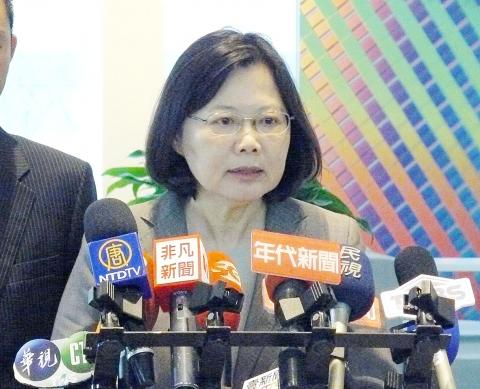In response to President Ma Ying-jeou’s (馬英九) request that she elaborate on her cross-strait agenda, Democratic Progressive Party (DPP) Chairperson Tsai Ing-wen (蔡英文) yesterday said that she has explained it well already and criticized Ma for not knowing about the public’s real concerns.
“I explained clearly on April 15 that ‘maintaining the status quo’ refers to maintaining peace across the Taiwan Strait and maintaining stable developments in cross-strait relations,” Tsai said at the DPP’s headquarters in Taipei on the sidelines of the party’s Central Executive Committee meeting.
“There is a newly released opinion poll showing that as much as 74 percent of the public agrees with such an idea — showing that what I have said is in accordance with public expectations,” she said.

Photo: CNA
In a speech on cross-strait development yesterday, Ma said that Tsai, as the DPP’s candidate for next year’s presidential election, has a duty to clearly define what she means by the “status quo” and her plans to maintain it.
In response to Ma’s comment that she is trying to avoid the “one China” issue, Tsai said that there was no need for Ma to repeat the same thing, because “that is not something that the public cares about,” and that speaking about “one China” would not help to resolve the real problems that Taiwan faces.
“If what he says is ‘useful,’ there would not be so many people upset with his government,” Tsai said.
Tsai said she met yesterday with Taiwan Semiconductor Manufacturing Co (TSMC) chairman Morris Chang (張忠謀) to discuss the future of Taiwan’s industries, labor rights, environmental issues, the gap between poor and rich, and the differences between southern and northern Taiwan.
“I think these are the issues that the people are really concerned about,” the DPP chairperson said.
“It is rather disappointing that, after being the president for seven years, Ma still does not know what the public really cares about. I do not understand why he had to go to the Mainland Affairs Council to say what he said,” Tsai said.
“These are things that he has repeatedly said in the past. If they were useful and acceptable to the public, he would not need to repeat them, and he would not have lost the public’s trust,” she said.
Tsai said that she sympathizes with Ma, as he has to ask these questions on behalf of the Chinese Nationalist Party (KMT) presidential candidate before the party has selected one.

A magnitude 7.0 earthquake struck off Yilan at 11:05pm yesterday, the Central Weather Administration (CWA) said. The epicenter was located at sea, about 32.3km east of Yilan County Hall, at a depth of 72.8km, CWA data showed There were no immediate reports of damage. The intensity of the quake, which gauges the actual effect of a seismic event, measured 4 in Yilan County area on Taiwan’s seven-tier intensity scale, the data showed. It measured 4 in other parts of eastern, northern and central Taiwan as well as Tainan, and 3 in Kaohsiung and Pingtung County, and 2 in Lienchiang and Penghu counties and 1

A car bomb killed a senior Russian general in southern Moscow yesterday morning, the latest high-profile army figure to be blown up in a blast that came just hours after Russian and Ukrainian delegates held separate talks in Miami on a plan to end the war. Kyiv has not commented on the incident, but Russian investigators said they were probing whether the blast was “linked” to “Ukrainian special forces.” The attack was similar to other assassinations of generals and pro-war figures that have either been claimed, or are widely believed to have been orchestrated, by Ukraine. Russian Lieutenant General Fanil Sarvarov, 56, head

FOREIGN INTERFERENCE: Beijing would likely intensify public opinion warfare in next year’s local elections to prevent Lai from getting re-elected, the ‘Yomiuri Shimbun’ said Internal documents from a Chinese artificial intelligence (AI) company indicated that China has been using the technology to intervene in foreign elections, including propaganda targeting Taiwan’s local elections next year and presidential elections in 2028, a Japanese newspaper reported yesterday. The Institute of National Security of Vanderbilt University obtained nearly 400 pages of documents from GoLaxy, a company with ties to the Chinese government, and found evidence that it had apparently deployed sophisticated, AI-driven propaganda campaigns in Hong Kong and Taiwan to shape public opinion, the Yomiuri Shimbun reported. GoLaxy provides insights, situation analysis and public opinion-shaping technology by conducting network surveillance

‘POLITICAL GAME’: DPP lawmakers said the motion would not meet the legislative threshold needed, and accused the KMT and the TPP of trivializing the Constitution The Legislative Yuan yesterday approved a motion to initiate impeachment proceedings against President William Lai (賴清德), saying he had undermined Taiwan’s constitutional order and democracy. The motion was approved 61-50 by lawmakers from the main opposition Chinese Nationalist Party (KMT) and the smaller Taiwan People’s Party (TPP), who together hold a legislative majority. Under the motion, a roll call vote for impeachment would be held on May 19 next year, after various hearings are held and Lai is given the chance to defend himself. The move came after Lai on Monday last week did not promulgate an amendment passed by the legislature that